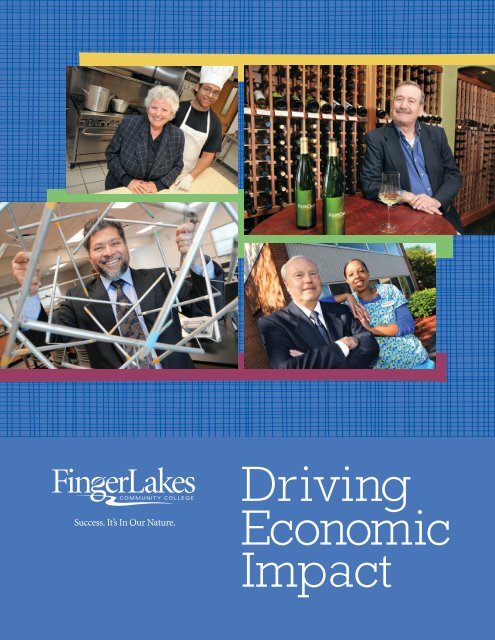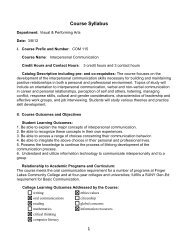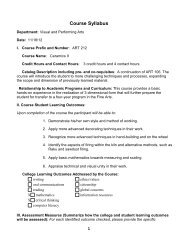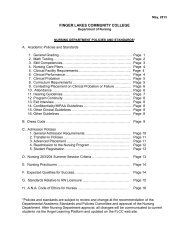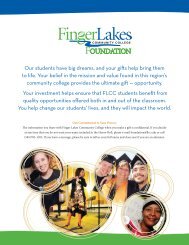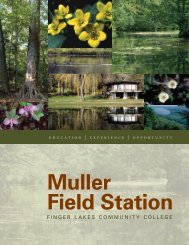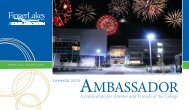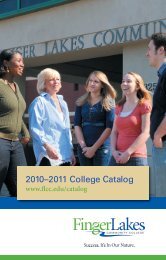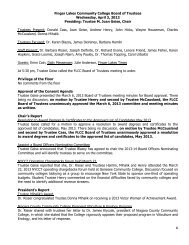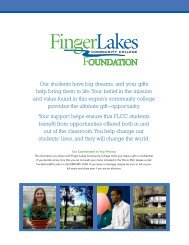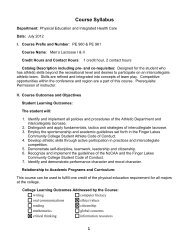Driving Economic Impact - Finger Lakes Community College
Driving Economic Impact - Finger Lakes Community College
Driving Economic Impact - Finger Lakes Community College
You also want an ePaper? Increase the reach of your titles
YUMPU automatically turns print PDFs into web optimized ePapers that Google loves.
<strong>Driving</strong><br />
<strong>Economic</strong><br />
<strong>Impact</strong>
Contents<br />
3<br />
5<br />
6<br />
9<br />
10<br />
12<br />
14<br />
2<br />
FLCC and Jobs<br />
in Western New York<br />
The Critical Role of FLCC<br />
and New York State’s<br />
<strong>Community</strong> <strong>College</strong>s<br />
FLCC’s Academic<br />
Programs<br />
FLCC’s Role in<br />
Middle-Skill Jobs<br />
Workforce Training<br />
and FLCC’s Professional<br />
Development and<br />
Continuing Education<br />
Office (PDCE)<br />
Public-Private<br />
Partnerships at FLCC<br />
Facts and Stats<br />
As a community college, <strong>Finger</strong> <strong>Lakes</strong> is focused on our role<br />
as a dynamic learning resource, central to the economic<br />
vitality of our region. In the past six years, our enrollment has<br />
grown 39 percent. We recently completed construction on a new<br />
Student Center, which will be the first LEED certified public building<br />
in Ontario County. The main classroom building in Canandaigua<br />
is undergoing a major renovation to create 26 new and renovated<br />
classrooms and laboratories to serve our growing population.<br />
In addition to the main Canandaigua campus, FLCC has three<br />
campus centers in Geneva, Newark and Victor. These centers<br />
are aligned closely to the communities they serve. Each has<br />
a community advisory committee that is actively involved with<br />
identifying the appropriate focus and programming for the center.<br />
Ultimately, FLCC focuses on training the local workforce.<br />
Through recently created degree programs, workforce and job training<br />
non-credit offerings, and public-private partnerships, we work directly<br />
with local industry leaders on curriculum development so our graduates<br />
can immediately fill job openings in the <strong>Finger</strong> <strong>Lakes</strong> region.<br />
For example, FLCC’s Viticulture and Wine Technology degree program<br />
was developed based on the counsel and expertise of local wine<br />
companies and winery owners. Another recent example is the innovative<br />
new Instrumentation and Control Technologies program, that was<br />
developed in collaboration with entrepreneurs and other representatives<br />
of a wide range of local high-tech businesses.<br />
FLCC’s Professional Development and Continuing Education (PDCE)<br />
programs are also meeting business needs and educating workers<br />
for healthcare, technology, advanced manufacturing, and other<br />
critical workforce requirements.<br />
FLCC is a State University of New York (SUNY) community<br />
college serving Ontario, Seneca, Wayne and Yates counties<br />
3325 Marvin Sands Drive Canandaigua, NY 14424<br />
(585) 394-FLCC | www.flcc.edu
<strong>Finger</strong> <strong>Lakes</strong> <strong>Community</strong> <strong>College</strong><br />
means jobs for Western New York<br />
FLCC ranks first in successful outcomes<br />
in the Rochester and <strong>Finger</strong> <strong>Lakes</strong> area and second out<br />
of 29 SUNY community colleges. Successful outcomes<br />
represent students who have graduated, transferred or<br />
continue to pursue higher education three years after enrolling.<br />
FLCC beats the average SUNY community college<br />
cost per student by more than $1,000. FLCC’s cost<br />
per student in 2010–11 was $7,840; the SUNY average<br />
was just shy of $9,000.<br />
FLCC meets the need for local health care workers.<br />
FLCC nursing graduates are in high demand, and 96 percent<br />
of FLCC certified nursing assistant graduates get jobs shortly<br />
after graduation. PDCE’s Home Health Aide (HHA) training<br />
program is filling a vital niche in the region’s health care<br />
industry. Based on rapid growth in home health care and<br />
high replacement needs, professionally-trained home health<br />
workers are a much-needed and valuable community resource.<br />
FLCC serves a growing proportion of the community.<br />
While general population figures are flat, enrollment at FLCC<br />
has grown from a total of 4,910 full- and part-time students<br />
in fall 2005 to 6,811 full- and part-time students in fall 2011,<br />
a 39 percent increase.<br />
FLCC is affordable and accessible for low- and middle-<br />
income families. Fewer than half of all FLCC students leave<br />
with debt.<br />
“ <strong>Community</strong> colleges are<br />
vital to our region’s future<br />
economic prosperity.<br />
”<br />
— Rob Sands, President and CEO, Constellation Brands, Inc.<br />
Ontario<br />
Wayne<br />
Yates<br />
Seneca<br />
FLCC Main Campus, Canandaigua<br />
FLCC Geneva Campus Center<br />
FLCC Victor Campus Center<br />
FLCC Wayne County Campus Center, Newark<br />
Located in the heart of the <strong>Finger</strong> <strong>Lakes</strong> region,<br />
FLCC is a State University of New York (SUNY)<br />
community college serving Ontario, Seneca,<br />
Wayne and Yates counties. The <strong>College</strong> has<br />
Campus Centers in Geneva, Newark and Victor.<br />
According to the U.S. Bureau of Labor<br />
Statistics, 43 percent<br />
of the new jobs<br />
in the next decade<br />
will require more than a high school<br />
diploma but less than a four-year degree.<br />
“Hands-on training becomes a booming business,”<br />
Democrat and Chronicle, Rochester,<br />
February 6, 2011<br />
3
4<br />
New York community colleges mean<br />
jobs for NeW York<br />
<strong>Community</strong><br />
colleges have long<br />
been heralded as<br />
essential resources,<br />
and as the economy continues<br />
its climb, they are also a vital<br />
link to the job market. Because<br />
they are affordable, accessible<br />
and offer a wide range of job-training<br />
programs, they are helping workers<br />
meet the post-recession demand<br />
for different sets of job skills.<br />
“<strong>Community</strong> colleges helping to fuel job market,”<br />
Democrat and Chronicle, Rochester,<br />
January 16, 2011<br />
President Barack Obama<br />
has called community<br />
colleges the “gateway for<br />
millions of Americans to<br />
good jobs and a better life.”<br />
The Obama Graduation Initiative calls for<br />
community colleges to turn out five million<br />
more graduates by 2020, making the U.S.<br />
the nation with the highest rate of college<br />
graduates once again.<br />
New York’s<br />
<strong>Community</strong> <strong>College</strong>s:<br />
Give 246,000 SUNY students access to an<br />
education that prepares them for jobs or transfer<br />
to a four-year school.<br />
Know the employment needs in their communities and<br />
move fast to fill them. Nearly 80 percent of community<br />
college graduates remain local.<br />
Provide business and industry training to approximately<br />
700,000 people per year. 1<br />
Are in the best position to educate tomorrow’s<br />
work force. By 2018, New York will create 2.8 million<br />
new or replacement jobs, and 63 percent of all jobs<br />
in New York (6.1 million jobs) will require some<br />
post-secondary training beyond high school. 2<br />
Provide opportunity to lower-income New Yorkers,<br />
who have been losing ground during the recession.<br />
Increase a graduate’s annual income by<br />
16 to 27 percent over the course of a lifetime. 3<br />
Lead the state in preparing students for jobs in the<br />
semi-conductor, green energy, health care, information<br />
communication technology, and emergency<br />
management fields.<br />
Generate a 7.7 percent rate of return to state<br />
and local governments on their financial support<br />
for community colleges. 4<br />
Help New York save $81 million per year in social<br />
costs, including savings associated with improved<br />
health, reduced crime, reduced social services,<br />
and lower unemployment. 4<br />
1. State University of New York<br />
2. Help Wanted: Projection of Jobs and Education Requirements<br />
Through 2018, Georgetown University Center on Education<br />
and the Workforce<br />
3. Kolesnikova (2009), Kane and Rouse (1995), Leigh and Gill (1997)<br />
4. EMSI (January 2011)
The Critical Role of FLCC<br />
and New York State’s <strong>Community</strong> <strong>College</strong>s<br />
<strong>Community</strong> colleges allow people at all stages in their lives to be lifelong learners.<br />
They are a distinctly homegrown creation, helping people fulfill a very American value: the opportunity<br />
of people to strive for the American dream. Moreover, our society benefits when everyone has access<br />
to higher education, and these institutions give more people that access.<br />
<strong>Community</strong> colleges like FLCC train and retrain workers, help align the workforce with employers’ needs,<br />
and put money in the pockets of people who are struggling to get ahead. <strong>Community</strong> colleges are<br />
a key driver in the economic recovery of our state. Out-of-work, dislocated or underemployed<br />
people must be trained for jobs that require skilled workers.<br />
SUNY is a powerful driver in New York’s economic recovery. SUNY’s community colleges are<br />
powerful economic engines, with the ability to educate the local workforce and elevate the quality<br />
of life in their regions. <strong>Community</strong> college graduates tend to stay in the area rather than move out of state.<br />
At FLCC, 75 percent of our graduates remain in the region.<br />
FLCC has a track record of working with community and business leaders to build new<br />
programs that will prepare people for careers in the <strong>Finger</strong> <strong>Lakes</strong> region. For example,<br />
FLCC’s Instrumentation and Control Technologies degree was developed with the guidance of owners<br />
and managers of high-technology companies. Winemakers and vineyard owners offered vital input to<br />
the creation of the Viticulture and Wine Technology degree program. The FLCC-G.W. Lisk Advanced<br />
Manufacturing Machinist program, a non-credit offering, was created based on a public-private partnership.<br />
<strong>Community</strong> colleges are becoming the colleges of choice for many New York students,<br />
and FLCC’s combination of outstanding teaching, supportive atmosphere and high value makes<br />
us the true driving force behind the “power of SUNY” and the entire <strong>Finger</strong> <strong>Lakes</strong> region.<br />
5
6<br />
FLCC’s Academic<br />
Programs<br />
<strong>Finger</strong> <strong>Lakes</strong> <strong>Community</strong> <strong>College</strong> has a track record of collaborating<br />
with employers and workforce development leaders to make<br />
sure programs meet the needs of the regional economy.<br />
FLCC is connected to the community.<br />
FLCC faculty and staff know where the needs are, and<br />
the college puts its resources toward meeting those<br />
needs. Examples: Certified Nurse Assistant (CNA)<br />
training, Viticulture and Wine Technology, Instrumentation<br />
and Control Technologies (advanced manufacturing).<br />
FLCC is affordable.<br />
FLCC’s 2012-13 tuition is $3,654 per year for full-time<br />
students. Students who graduate from FLCC with an<br />
associate degree and transfer to a four-year college<br />
or university can save tens of thousands of dollars<br />
as compared to students who complete all four years<br />
at a college or university.<br />
FLCC is efficient.<br />
FLCC beats the average SUNY community college<br />
cost per student by more than $1,000. FLCC’s cost<br />
per student in 2010–11 was $7,840; the SUNY<br />
average was just shy of $9,000.<br />
FLCC is successful.<br />
FLCC’s two-year graduation rate is second out<br />
of 35 SUNY and CUNY community colleges<br />
and in the top 10 percent nationally.<br />
“<br />
Tuition for Retraining<br />
The state has awarded the <strong>Finger</strong> <strong>Lakes</strong> Workforce Investment<br />
Board a grant to provide full scholarships for up to 266<br />
unemployed workers in the Rochester area willing to train<br />
for a career in advanced manufacturing.<br />
The scholarships will provide up to $8,500 for tuition, fees<br />
and books for eligible students who enroll in two-year programs<br />
at <strong>Finger</strong> <strong>Lakes</strong> <strong>Community</strong> <strong>College</strong>, Genesee <strong>Community</strong><br />
<strong>College</strong> or Monroe <strong>Community</strong> <strong>College</strong>.<br />
The funding comes from a federal initiative to train American<br />
workers in high-growth jobs that employers are currently filling<br />
with foreign workers through a visa program. The funding is<br />
channeled through the state Department of Labor, which awards<br />
grants to programs across New York that can meet this goal.<br />
Prospective scholarship applicants should contact Bill Rotenberg<br />
at (315) 789-3131. Scholarships will cover the following programs:<br />
• Advanced Manufacturing<br />
• Biotechnology<br />
• Engineering Science<br />
• Manufacturing Technology<br />
• Optical Systems Technology<br />
• Precision Machining<br />
— Optical Fabrication<br />
• Instrumentation and<br />
Control Technologies<br />
• Mechanical Technologies<br />
• Computerized Drafting<br />
and Design<br />
FLCC recognizes the importance of<br />
listening to the needs of our local industry<br />
leaders and working to develop programs<br />
to meet those needs.<br />
”<br />
—Karen Springmeier<br />
<strong>Finger</strong> <strong>Lakes</strong> Workforce Investment Board
“<br />
Viticulture and Wine Technology<br />
Enabling students to learn, live and work in wine country<br />
According to the New York State Agriculture and Markets 2008 Wine Grape Task Force, based on the dramatic<br />
growth in the sector, the need for individuals with the specialized knowledge and skills necessary<br />
for employment in the viticulture and wine industry will continue to grow for the foreseeable future.<br />
<strong>Finger</strong> <strong>Lakes</strong> <strong>Community</strong> <strong>College</strong>’s Associate in Applied Science (A.A.S.) Viticulture and Wine Technology degree<br />
program is designed for students who plan to pursue a career at a vineyard or winery. Students will be able to<br />
complete their formal education in two years and begin a career, or they may choose to transfer to a four-year<br />
school, such as Cornell University.<br />
This program was developed based on the counsel and expertise of local wine companies and winery owners,<br />
Cornell University and Cooperative Extension expertise, the New York Wine and Culinary Center and others<br />
involved in the industry. Building on our well-known and established Environmental Conservation and Horticulture<br />
programs, this degree also includes an emphasis on sustainability, ensuring that the environmental issues<br />
so very important in the <strong>Finger</strong> <strong>Lakes</strong> region will be addressed.<br />
I see the FLCC program as<br />
being a tremendous catalyst<br />
for upgrading the level of<br />
applicants for vineyard and<br />
winery positions for <strong>Finger</strong><br />
<strong>Lakes</strong> wineries. Many of the students<br />
are likely to be from New York and will be<br />
interested in pursuing careers in the local<br />
industry. Previously, it has been difficult to find<br />
skilled applicants with adequate backgrounds.<br />
This should also serve to funnel additional<br />
students into the four-year Viticulture and<br />
Enology program at Cornell University.<br />
”<br />
— David V. Peterson, CEO, Swedish Hill,<br />
Goose Watch and Penguin Bay Wineries<br />
On the horizon —<br />
FLCC’s Viticulture Center<br />
State Sen. Michael Nozzolio and Assembly Minority Leader<br />
Brian Kolb have secured $3.3 million in the 2012–13<br />
New York state budget for the <strong>College</strong> to build a Viticulture<br />
Center at the Cornell Agriculture and Food Technology<br />
Park, also known as The Technology Farm, in Geneva.<br />
FLCC’s Viticulture and Wine Technology degree program<br />
currently operates out of rented space at this location.<br />
The 6,830-square-foot building will meet the specific needs<br />
of the program, educate students using state-of-the-art<br />
equipment and laboratories, and provide hands-on experience<br />
cultivating vines in various stages of development. Each room<br />
has been designed with help from wine industry professionals<br />
and Cornell University to provide students with extensive<br />
hands-on winemaking production experience. An adjacent<br />
vineyard will provide students with the opportunity to learn<br />
vineyard management techniques.<br />
7
8<br />
Instrumentation and Control Technologies<br />
Opening doors to employment in high-tech fields<br />
Explore a unique, high-tech, hands-on degree program at FLCC’s convenient Victor Campus Center.<br />
Learn the tools and techniques of emerging technologies – crucial for designing, testing, manufacturing<br />
and quality control in industrial, commercial, medical and other settings. These adaptable skills are critical<br />
for rapid innovations in our systems of advanced manufacturing, packaging, distribution, healthcare,<br />
transportation, electric grid, Internet, and defense industries and other settings. FLCC’s new Associate<br />
in Applied Science (A.A.S.) Instrumentation and Control Technologies degree program blends theoretical<br />
and hands-on learning to prepare graduates for positions in a variety of high-tech fields. Students will<br />
learn techniques of automated data acquisition, instrument control, motion control and machine-vision<br />
using LabVIEW software, and other tools of automation, including microcontrollers and programmable<br />
logic controllers.<br />
The program also features a required internship to give students exposure to skills and knowledge beyond<br />
what is learned in the classroom. Students share the knowledge they gain during the internship with<br />
their fellow classmates through presentations during class time. These valuable internship<br />
opportunities give students work experience that can lead to a successful career.<br />
Internship opportunities exist with more than a dozen successful local companies.<br />
The <strong>Finger</strong> <strong>Lakes</strong> Advanced Manufacturers’ Enterprise,<br />
or FAME, is an initiative of the <strong>Finger</strong> <strong>Lakes</strong> Workforce<br />
Investment Board and a collaborative public/private<br />
partnership of regional stakeholders working to attract<br />
and grow the workforce talent in advanced manufacturing<br />
in the <strong>Finger</strong> <strong>Lakes</strong> region. As a result of their efforts,<br />
<strong>Finger</strong> <strong>Lakes</strong> <strong>Community</strong> <strong>College</strong> developed the<br />
A.A.S. degree in Instrumentation and Control Technologies.<br />
This unique, high-tech, hands-on<br />
degree program offers students<br />
an opportunity to learn the tools<br />
and techniques of emerging<br />
technologies which are crucial<br />
for designing, testing,<br />
manufacturing and quality<br />
control in industrial, commercial,<br />
medical and other settings.<br />
Source: New York’s Forgotten Middle-Skill Jobs,<br />
National Skills Coalition, March 2011<br />
“<br />
The Instrumentation and<br />
Control Technologies degree<br />
program at the Victor<br />
Campus Center fills a<br />
need for skilled workers<br />
in advanced manufacturing.<br />
Students see how traditional courses such<br />
as math and physics are relevant in today’s<br />
workforce while receiving hands-on training<br />
in emerging technologies. Local employers<br />
have pledged internships that in many cases<br />
will turn directly into jobs.<br />
”<br />
—Sam Samanta, Professor, Physics
FLCC’s Role in<br />
Middle-Skill Jobs<br />
What are middle-skill jobs?<br />
Middle-skill jobs, which require more than a high school education but not a four-year degree, currently<br />
make up the largest segment of jobs in the U.S. economy and will continue to do so for years to come.<br />
In 2009, about 46 percent of all jobs were classified as middle-skill, but only 39 percent of New York<br />
workers had the required education and training to fill those positions.<br />
Some 39 percent of all job openings in New York between now and 2018 will be in middle-skill jobs.<br />
New York’s projected education trends for the subsequent 15 years suggest that middle-skill worker<br />
shortages will continue.<br />
Source: New York’s Forgotten Middle-Skill Jobs, National Skills Coalition, March 2011<br />
Middle-skill jobs are<br />
available to those<br />
who have completed:<br />
• Two-year degree programs<br />
• Licensure Training<br />
• Certificate/credentialed training<br />
• Nationally recognized educational programs<br />
FLCC helps fill local<br />
middle-skill jobs. Through associate<br />
degree programs, such as Viticulture and Wine Technology,<br />
and Instrumentation and Control Technologies, as well as<br />
non-credit training programs through FLCC’s Professional<br />
Development and Continuing Education office, FLCC<br />
focuses on training the local workforce.<br />
“<br />
Middle-skill workers are<br />
already in high demand and<br />
are needed to help companies<br />
like Optimax compete and<br />
grow. Our company has a<br />
three-year plan to add three-<br />
to-four net new jobs every<br />
month. But our company<br />
is struggling to find the<br />
workers to fill them.<br />
That’s why companies like ours are working<br />
diligently with local community colleges to<br />
educate workers, and why we’re now looking<br />
to partner with middle schools and high<br />
schools to ensure the education pipeline<br />
develops the workers our economy needs<br />
to compete and grow.<br />
”<br />
—Mike Mandina, President<br />
Optimax Systems<br />
9
10<br />
Workforce Training<br />
FLCC’s Professional Development<br />
and Continuing Education Office<br />
Not everyone goes to FLCC to pursue an associate degree<br />
or has plans to transfer to a four-year school. For those who<br />
want to make other choices, FLCC offers training, certification<br />
and custom training programs that<br />
prepare people for jobs in demand.<br />
Health care, business, the travel industry—you name it—<br />
FLCC is constantly developing new and innovative<br />
business solutions through its workforce and job<br />
training non-credit offerings. We interact with local<br />
employers and prospective workers to fulfill business<br />
and workforce needs in our communities.<br />
Regional businesses and not-for-profit<br />
organizations partner with FLCC’s Professional<br />
Development and Continuing Education office on<br />
many initiatives, including the Nurse Assistant/Home<br />
Health Aide Dual Certification Program. Certificate<br />
programs and non-credit training are offered at FLCC<br />
in high-demand fields such as health care, advanced<br />
manufacturing, technology and more.<br />
“<br />
Workforce and job training<br />
offered at FLCC through<br />
the PDCE office includes:<br />
• Advanced Manufacturing Machinist<br />
• Healthcare: Nurse Assistant<br />
Home Health Aide<br />
Direct Support Professional<br />
• Leadership/Supervisory/Lean Training<br />
• Customized Computer Training<br />
We provide training to individuals<br />
ready to enter the workforce or<br />
looking for a new career. It is inspirational<br />
to see a person complete a non-credit training program,<br />
obtain work, and return to FLCC to further their education<br />
and career.<br />
”<br />
—Lynn Freid, Manager of Business<br />
Development and Training (center).<br />
Pictured with Professional Development and Continuing<br />
Education Specialists Marcia Lynch (left) and Colleen Aiezza (right)
FLCC works with G.W. Lisk<br />
to train students for machinist<br />
jobs in advanced manufacturing.<br />
“G.W. Lisk, like many advanced manufacturers, has<br />
jobs it cannot fill due to a lack of skilled workers,” says<br />
Scott Cummings, manufacturing manager for the<br />
company. “We turned to FLCC for its experience<br />
in educational programming to help us put together<br />
a course in the basics of machining. Graduates could<br />
apply for jobs with us or any number of advanced<br />
manufacturers in the region.”<br />
“G.W. Lisk’s story is common. Traditional manufacturing<br />
may have declined, but the great untold story in the<br />
Rochester region is the success of advanced manufacturing<br />
companies, which offer a very different work environment<br />
and require higher-level skills,” said Lynn Freid, manager<br />
of business development and training for FLCC.<br />
“Machining and other technical jobs in advanced<br />
manufacturing can form a solid foundation for those who<br />
continue on to get degrees in engineering or manufacturing,<br />
CAD/CAM (computer-aided design and computer-aided<br />
manufacturing), or machine tool technologies,” she said.<br />
All 10 members of the first class had full-time jobs by the<br />
time they graduated in March 2012.<br />
FLCC teams up with<br />
Moser Baer to launch cleanroom<br />
technician training program.<br />
“We will have a need over the next two years to hire approximately<br />
30 to 40 cleanroom operators who will watch over production<br />
of organic light-emitting diode (OLED) lighting panels,” said<br />
David Newman, vice president of Moser Baer Technologies.<br />
“This is a new kind of position, and the people we hire will<br />
need to walk in with the basic understanding of the<br />
protocols, conditions, and requirements for working<br />
in a cleanroom setting.”<br />
“We are delighted to be working so closely with Moser Baer<br />
Technologies to help train workers for well-paying and secure<br />
jobs in this exciting industry,” said Lynn Freid of Professional<br />
Development and Continuing Education at FLCC.<br />
“It is a great partnership with room to grow, which<br />
is a win-win for everyone.”<br />
FLCC’s PDCE office works<br />
directly with employers<br />
to meet industry sector<br />
middle-skill training needs:<br />
G.W. Lisk Regional Advanced Manufacturing<br />
Training Center: Non-credit training leads<br />
to credit and non-credit certificates which lead<br />
to degree programs<br />
Moser Baer/Smart Systems Technology &<br />
Commercialization Center of Excellence:<br />
Cleanroom operator training<br />
Wayne Table Works: 1-2-3 Green series<br />
food service/customer service training<br />
Ontario/Wayne County: Lead to Succeed<br />
Leadership training<br />
Cayuga-Seneca County: The Wine Tasting Room<br />
Experience training<br />
<strong>Finger</strong> <strong>Lakes</strong> Workforce Investment Board:<br />
Youth Program: Computer skills // Serv Safe //<br />
NRF // Customer Service // OSHA safety trainings<br />
FLCC awarded<br />
$50,000 training grant<br />
An FLCC job training project was among the<br />
$68.8 million awarded to the <strong>Finger</strong> <strong>Lakes</strong> Regional<br />
<strong>Economic</strong> Development Council. The <strong>College</strong><br />
received $50,000 to put unemployed workers<br />
through non-credit training that leads to an industry<br />
recognized credential. This grant will fund training<br />
costs for nurse assistant/home health aide students.<br />
11
12<br />
Public-Private<br />
Partnerships at FLCC<br />
<strong>Community</strong> colleges are on the move across America.<br />
Now educating nearly half of all undergraduates in the United States, community colleges have come of age.<br />
With support from individuals, foundations, corporations and small businesses striving to make a meaningful<br />
impact on the future of their communities, the sky is the limit. Public-private partnerships with community<br />
colleges inspire invention and innovation and drive economic impact for our region.<br />
“ I’ve<br />
“ FLCC<br />
Developed in partnership with the<br />
New York Wine & Culinary Center,<br />
FLCC’s new culinary arts degree<br />
gives students the opportunity to learn both the art and the<br />
business of the food service industry. Students will learn the<br />
latest trends and apply practical skills in a real-world setting.<br />
has taken the lead to partner with local<br />
manufacturers to promote and develop talent<br />
pipelines for high technology-oriented jobs through its Instrumentation<br />
and Control Technologies program. The <strong>College</strong>’s support of the <strong>Finger</strong> <strong>Lakes</strong><br />
Advanced Manufacturers’ Enterprise (FAME) will result in job placements<br />
(internships) and student engagement that would not occur otherwise.<br />
—Ron Golumbeck, ITT Goulds Pumps ”<br />
found that having CMAC on<br />
the FLCC campus is a perfect fit.<br />
We have a winning partnership here in Canandaigua,<br />
on this jewel of a campus under the stars.<br />
”<br />
—Richard Sands, Chairman of the Board of Directors<br />
Constellation Brands, Inc.
INVESTMENT in community<br />
colleges = educational<br />
and community solutions<br />
FLCC beats the average SUNY community<br />
college cost per student by more than $1,000.<br />
FLCC’s cost per student in 2010–11 was $7,840;<br />
the SUNY average was just shy of $9,000.<br />
FLCC gets results. FLCC is No. 2 among<br />
29 SUNY community colleges for successful<br />
outcomes. (The percentage of students<br />
who have graduated, transferred or are still<br />
pursing higher education after six semesters<br />
is 62 percent.) This figure does not include<br />
those who have found jobs within six semesters.<br />
FLCC’s main campus expansion and<br />
renovation will be funded in part with<br />
$7 million in contributions from<br />
non-profits affiliated with the college,<br />
a substantial savings for local taxpayers.<br />
The FLCC Association, which operates the<br />
food service, bookstore and other services,<br />
will contribute $4 million, and the FLCC<br />
Foundation, which raises money from the<br />
private sector, will contribute $3 million.<br />
NYS matches all private<br />
contributions to FLCC’s<br />
capital project, dollar-for-<br />
dollar. This investment<br />
reaps rewards and attracts<br />
new donors to the college<br />
interested in public-private<br />
partnerships which<br />
yield results.<br />
“<br />
I chose to name the multi-purpose<br />
room at the Victor Campus<br />
Center because of the role<br />
this campus plays in educating<br />
workers who will fill future<br />
jobs in the private sector.<br />
— Paul Griswold, President and CEO<br />
<strong>Finger</strong> <strong>Lakes</strong> Technologies Group<br />
”<br />
13
14<br />
Facts and Stats<br />
<strong>Finger</strong> <strong>Lakes</strong> <strong>Community</strong> <strong>College</strong><br />
Did you know?<br />
In 2010, nearly half of all undergraduates in the U.S. were studying at community colleges.<br />
Graduates with an associate degree earn an average of $405,600 more over<br />
their lifetime as compared with those holding only a high school diploma.<br />
Among job openings between 2008 and 2018, the fastest growth is projected for<br />
occupations requiring an associate degree.<br />
Students who graduate with an associate degree and transfer to a four-year college<br />
or university can save thousands of dollars as compared to students who complete<br />
all four years at a college or university.<br />
About FLCC<br />
Of 6,811 students in fall 2011, 75 percent of FLCC students received some form of financial aid.<br />
Many FLCC students are first generation—the first in their family to go to college.<br />
FLCC ranks first in successful outcomes in the Rochester and <strong>Finger</strong> <strong>Lakes</strong> area and second out<br />
of 29 SUNY community colleges. Successful outcomes represent students who have graduated,<br />
transferred or continue to pursue higher education three years after enrolling.<br />
<strong>Finger</strong> <strong>Lakes</strong> <strong>Community</strong> <strong>College</strong> ranks among the fastest-growing two-year colleges in the<br />
nation, according to <strong>Community</strong> <strong>College</strong> Week magazine. The November 29 issue (2010)<br />
of the national publication ranked FLCC 40th on a list of the top 50 fastest-growing community<br />
colleges with an enrollment of 5,000 to 9,999. The ranking accompanied an article on surges<br />
in enrollment at community colleges nationwide amid the economic downturn.<br />
Ontario County is FLCC’s sponsoring county and we also serve the educational<br />
needs of Seneca, Wayne and Yates counties.
Through FLCC’s non-credit Adult Basic Education<br />
program, FLCC serves educationally, economically,<br />
and culturally disadvantaged individuals in need<br />
of literacy services. Our main campus and both<br />
the Geneva and Wayne County campus centers<br />
host literacy services, which include General<br />
Equivalency Diploma (GED) and English as a<br />
Second Language (ESL) classes. As a result,<br />
these individuals upgrade their workplace literacy<br />
skills, increase their English language skills,<br />
and are more employable.<br />
FLCC also offers Professional Development and<br />
Data from <strong>Economic</strong> Modeling Services, Inc.<br />
Continuing Education (PDCE) non-credit training<br />
opportunities. We help people train for jobs, pursue<br />
study, February 2011<br />
business-oriented job certificates, and enhance their<br />
personal and professional development. Opportunities<br />
range from employee skills training to customized<br />
business training. An example of a non-credit training offering at FLCC is the highly successful<br />
Certified Nurse Assistant (CNA) program, which helps people prepare for jobs in the health care field.<br />
FLCC’s 2012–13 tuition is $3,654 per year for full-time students. FLCC offers 54 degree and certificate<br />
programs, including both online and classroom offerings. Programs include Environmental Conservation,<br />
Business Administration, Instrumentation and Control Technologies, Criminal Justice, Music Recording<br />
Technology, Nursing, Communications, Culinary Arts, and Graphic Design. FLCC also offers New York<br />
state’s first-ever Viticulture and Wine Technology associate degree program.<br />
FLCC has about 22,000 alumni; 75 percent of whom live and work in the region.<br />
The most recent graduating class, the Class of 2012, had 925 graduates.<br />
35 percent more…<br />
Over the course of a working lifetime,<br />
associate degree graduates in the<br />
FLCC four-county service area earn<br />
$405,600 more<br />
than someone with a high school diploma.<br />
15
Printed August 2012


